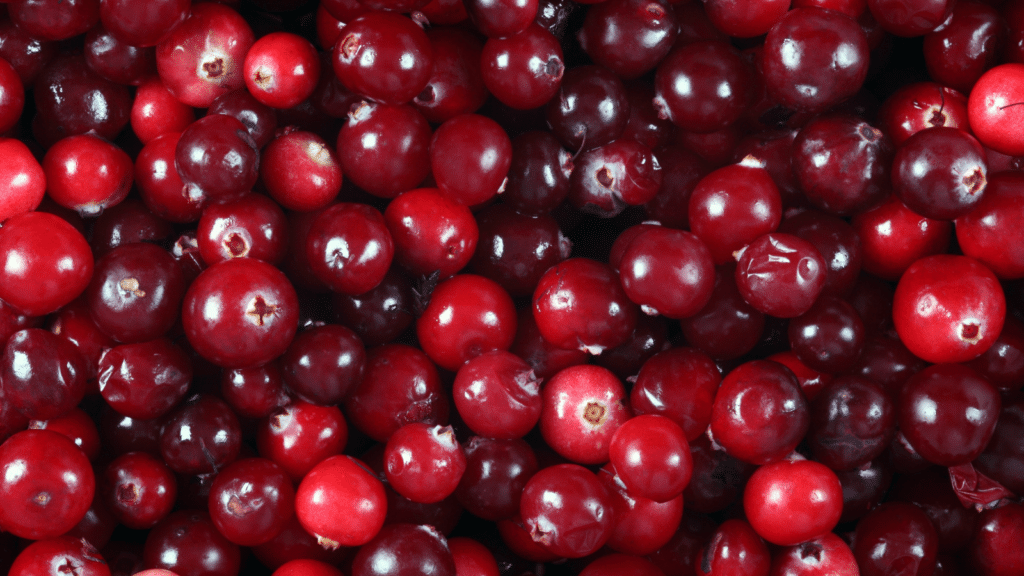
Cranberries have long been a staple of holiday meals, adorning tables as vibrant sauces or decorative garnishes. But beyond their festive flair, these ruby-red berries offer a surprising array of health benefits. Native to North America, cranberries have been celebrated for centuries for their medicinal properties and tart, refreshing taste. This post explores the nutritional power of cranberries, delves into who can benefit most from their consumption, and outlines who might need to exercise caution.
Let’s dive into why cranberries are much more than a seasonal treat – they’re a superfood with year-round health benefits.
The Nutritional Profile of Cranberries
Cranberries are packed with nutrients that make them a powerhouse for health. A single cup of raw cranberries contains:
- Vitamin C: Boosts immunity and promotes healthy skin.
- Vitamin E: Works as an antioxidant, protecting cells from damage.
- Vitamin K: Supports the process of healthy blood clotting and bone health.
- Fiber: Aids digestion and promotes gut health.
- Antioxidants and Phytonutrients: Combat oxidative stress and inflammation.
One of the standout compounds in cranberries is proanthocyanidins (PACs), which play a critical role in preventing bacterial adhesion – a key factor in their health benefits. Additionally, they are naturally low in calories and sugar (when unsweetened), making them a great choice for health-conscious individuals.
Health Benefits of Cranberries
Urinary Tract Health
Cranberries are best known for preventing urinary tract infections (UTIs). The PACs in cranberries inhibit bacteria, particularly E. coli, from adhering to the urinary tract lining. This mechanism helps reduce the likelihood of infection, making cranberries a go-to for those prone to UTIs.
More about the UTI tests here.
Heart Health
The antioxidants in cranberries support cardiovascular health by reducing inflammation, improving cholesterol levels, and supporting healthy blood pressure. Studies suggest that regular cranberry consumption may lower the risk of heart disease, making them a heart-friendly addition to your diet.
More about Heart Health tests here.
Gut Health
Emerging research shows that cranberries’ phytonutrients support a healthy gut microbiome. These compounds promote the growth of beneficial bacteria while potentially reducing harmful strains. Including cranberries in your diet could lead to better digestive health and improved nutrient absorption.
Immune Support
Rich in vitamin C, cranberries help bolster the immune system, making them particularly valuable during the cold and flu season. Their antimicrobial properties may also help reduce the risk of infections.
Looking for the best Immunity tests go here.
Skin Health
Cranberries’ high antioxidant content can combat free radicals, which contribute to skin aging. Regular consumption may support healthier, more youthful-looking skin by reducing oxidative stress.
Who Benefits the Most from Cranberries?
People Prone to UTIs
Women, in particular, may benefit from incorporating cranberries into their diet, as they are more susceptible to urinary tract infections. Cranberries can be a natural way to reduce the frequency of UTIs without relying solely on antibiotics.
Those Looking to Improve Heart Health
Middle-aged and older adults seeking to support cardiovascular health can benefit from the heart-protective properties of cranberries. Their ability to improve cholesterol profiles and reduce inflammation makes them a valuable dietary addition.
Fitness Enthusiasts
Athletes and fitness enthusiasts may find cranberries beneficial in combating exercise-induced oxidative stress. Their anti-inflammatory properties can aid in recovery and reduce muscle soreness.
Individuals Focused on Digestive Health
Cranberries’ ability to promote a balanced gut microbiome makes them ideal for those aiming to improve digestion and overall gut health. Including cranberries in daily meals can enhance the diversity of beneficial bacteria.
Who Should Avoid Cranberries or Use Caution?
Individuals with Kidney Stones
Cranberries calso contain oxalates, which can contribute to kidney stone formation in susceptible individuals. If you have a history of kidney stones, it’s best to consult a healthcare provider before consuming large amounts of cranberries.
People Taking Blood Thinners
Cranberries contain vitamin K, which may interfere with blood-thinning medications like warfarin. If you’re on such medications, discuss cranberry consumption with your doctor.
Those with Gastrointestinal Sensitivities
The high acidity of cranberries can irritate the stomach or cause digestive discomfort in some people, particularly when consumed in large quantities or in their raw form.
Incorporating Cranberries into Holiday Meals
Creative Holiday Recipes
- Cranberry Sauce: Opt for a low-sugar or honey-sweetened version to keep it healthy.
- Salads: Add unsweetened dried cranberries to green salads or grain bowls for a tart, chewy texture.
- Savory Dishes: Use cranberries in stuffings, glazes for meats, or roasted vegetable medleys.
Drinks and Snacks
- Holiday Mocktails: Cranberry juice paired with sparkling water and a sprig of rosemary makes for a festive, healthy drink.
- Trail Mix: Combine unsweetened dried cranberries with nuts and seeds for a nutrient-packed snack.
Tips for Choosing the Healthiest Option
- Go for fresh or frozen cranberries whenever possible.
- If choosing dried cranberries, look for unsweetened varieties to avoid excess sugar.
- Check labels on cranberry juice and opt for pure, unsweetened options to maximize health benefits.
Fun Holiday Cranberry Trivia
- Did you know cranberries are also called “bounceberries” because they bounce when ripe?
- Native Americans used cranberries not only as food but also as medicine and dye.
- Cranberries are harvested in water-filled bogs, creating a stunning sea of red during the harvest season.
Conclusion: Celebrate the Holidays with Cranberries
Cranberries are more than just a festive addition to holiday meals – they’re a nutrient-rich superfood with impressive health benefits. Whether you’re looking to boost your heart health, support your immune system, or enjoy a tart and tangy treat, cranberries have something to offer. Just remember to enjoy them in moderation and consider any health concerns you may have.
Why not try incorporating cranberries into new recipes or refreshing old favorites this holiday season? Share your cranberry creations and make this year’s celebrations delicious and nutritious!

